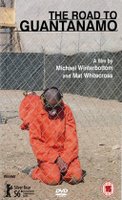The Road To Guantánamo (or, Why Army personnel should not be in charge of Anything)
 I am going to try to keep this post as free of political commentary as I am able. It is a quite a feat when discussing "The Road To Guantánamo", Michael Winterbottom's new docu-film (co-directed with Matt Whitecross).
I am going to try to keep this post as free of political commentary as I am able. It is a quite a feat when discussing "The Road To Guantánamo", Michael Winterbottom's new docu-film (co-directed with Matt Whitecross). Winterbottom has long been one of my favourite directors, not least for his love of highly varied subject matter and genre. In this work he has taken the testimonies of the "Tipton Three" (the three Britons held in the United States' terrorist holding base) and built an horrifying re-enactment that traces their steps from Birmingham to Cuba where they are tortured and interrogated by American and British officials.
The structure of the film is reminiscent of something you could find on any investigative current affairs re-enactment but the film is saved from its association with these small screen fore-runners by its naturalistic tone and by the superb characterisation of the actor playing the young muslim boys. The film is not a polemic, it doesn't seek to make a case for the boys, it merely presents their story. It documents how they set out for Pakistan for the wedding of one of the boys, how they stumbled upon a mosque where there was a call to help the people of Afganistan, and how the boys crossed into Afganistan as the bombs began to fall. Essentially, and this is something that the film didn't show quite strongly enough, these three Brits were just some young guys out for a road trip and they were naively dragging each other towards the wrong place at the wrong time.
 By the time they realise this, amid the devastation, it is too late and the boys are "captured" and given over to the U.S. forces. In scenes reminiscent of Schindler's List, the captives are shipped from Afganistan to Cuba. There, under the control of the American forces, they are interrogated for almost two years. The horrors they endure are viscerally captured but their essential "ladishness" gives them a very human face against the onslaught and absurdity of the armed forces. What possible justification could the army have for forcing these boys, or any of the inmates of Guantánamo, into confessing what they are essentially being told they have done? That is the one question that sticks long after the film has ended. Ultimately the army comes away looking childishly bull-headed.
By the time they realise this, amid the devastation, it is too late and the boys are "captured" and given over to the U.S. forces. In scenes reminiscent of Schindler's List, the captives are shipped from Afganistan to Cuba. There, under the control of the American forces, they are interrogated for almost two years. The horrors they endure are viscerally captured but their essential "ladishness" gives them a very human face against the onslaught and absurdity of the armed forces. What possible justification could the army have for forcing these boys, or any of the inmates of Guantánamo, into confessing what they are essentially being told they have done? That is the one question that sticks long after the film has ended. Ultimately the army comes away looking childishly bull-headed.Winterbottom has been open about how little he cares for how the governments of Britain and the U.S. will react to this film. "We were not trying to portray Americans badly. We were simply trying to show what happened," he said. Yes the film is biased; it is based purely on the accounts of the Guantánamo inmates. Some of the boys' actions beggar belief but nothing can diminish or justify the abuse they endure.
 It will be interesting to see if the film gets picked up in the States. Here it was shown on national television and is now available on DVD and for Internet download. The film has already taken away the Silver Bear (best director) at the Berlin Film Festival where it debuted in February and will definitely feature in more festivals around the world.
It will be interesting to see if the film gets picked up in the States. Here it was shown on national television and is now available on DVD and for Internet download. The film has already taken away the Silver Bear (best director) at the Berlin Film Festival where it debuted in February and will definitely feature in more festivals around the world. There is no doubt that this is an important and relevant film. The recent questioning of the actors as they returned from Berlin poetically reminds us of that fact.
Tags: movie review, documentary, Michael Winterbottom, terrorism, Guantámo Bay

8 Comments:
Like the recent controversy over "A Million Little Pieces" and the issue of truth in writing and memoir, I have mixed feelings about the "docu-film", "docu-drama" approach to a current (continuing) event of such enormous importance.
My main concern is that whatever documentary value the film has in presenting a persuasive, well-researched truth, will be overshadowed (and so easily dismissed) by those who will simply say: "It's fiction!"
The re-creation of events using actors lends a film an inevitable blush of dramatisation, which again, I imagine, will be argued as 'exaggeration' or 'distortion'.
It may sound like I am being far too precious, but the stakes are so high (for international law, for defining and limiting the powers of a government, for the very fundamentals of what may be considered "civil" society) that anything which could inadvertantly lend credence to those who would continue such atrocities worries me greatly.
All that said, I haven't yet seen the film or read any responses to it (other than by your dear self!), so I will wait to see if my fears are confirmed.
I understand your concerns but I don't know that removing the "dramatic" elements of the film are going to lend it any more credence for those who would deny the events depicted in the film.
Let's face it, documentary features will always be refuted by some commentators. Look at the work of John Pilger or Michael Moore. Those who agree with the use of "camps" like Guantánamo are not going to be swayed by this film.
I wouldn't have thought that the film is documenting anything that isn't in the public consciousness already. The effectiveness of the film comes in many ways from highlighting the absurdity of the situation and though the emotional connection that the audience can make with the boys, something that the dramatisation facilitates.
Absolutely. Making a film described as a "documentary" doesn't provide immunity from all of the same criticisms, other than the most obvious.
Perhaps those who would never be swayed (or would only be swayed) by cold hard facts are irrelevant to the filmmaker's purpose. In that case, it makes more sense to appeal to the hearts and minds of those for whom the emotional connection of a dramatisation facilitates a sense of outrage.
Your argument is very persuasive, Mr Scott.
Damn you Donald Ritchie! I wanted to have an all-in brawl over this. I was just readying the kickboxing gear.
Well, here's a free shot to both of you... (you can strap on the gloves now)
Do you think anyone cares, dramatisation, fact or complete fiction? Does it matter?
The US under its current administration (and I am not just talking about the presidency) will continue to do as it pleases (despite a certain public consciousness of these events), albeit with better secrecy. Hypocrisy is firmly entrenched as the new western sociopolitical lubricant. Though it is really not that new... just achieving greater scrutiny of late.
I very much doubt that "the hearts and minds of those for whom the emotional connection of a dramatisation facilitates a sense of outrage", as Donald eloquently puts it, matter much in the grand scheme of things.
In any event, such folk probably already detest the US government, though I concede that there are some who are too stupid to come to that realisation without the benefit of Michael Moore style polemic... but this film is not polemic according to your review...
In the end (and without the benefit of having seen the film either) is it not just a story about stupid young men, who discover what happens to stupid young men? Does truth or veracity add anything to that story?
Mr Belial, I have to take issue with a few things.
"Does anyone care?" Well, clearly yes. The individuals themselves, their families, the film-makers, the voters at the festival, the Red Cross, Amnesty International, the former head of legal counsel in the US Navy (who resigned in December), the International Commission of Jurists, the UN Commission on Human Rights, the European Council on Human Rights, the list of over 150 legal academics, scholars and NGO's who were amicus curiae in the case of 'Rasul v Bush' (including former US military officers)...list goes on and on.
Countless individuals and organisations have objected to the very existence of Camps X-Ray and Delta, and the legal "black-hole" of Guantanamo in which these so-called "enemy-combatants" are illegally held.
As to whether the opinion of the audience of this film "matters much in the grand scheme of things", I would argue that that remains to be seen.
In any event, those who shruggingly doubt their capacity for influence and their own ability to effect a political outcome (whether it be through a vote, or through shaming a government) will never do anything to test that misconception.
And finally, yes: people do a lot of stupid things, all of the time. However, the consequences of that stupidity ought not to be torture and prolonged detention without charge and without trial.
Nor should those consequences involve a country abandoning both international law, the rule of law, and the very reasons and principles upon which that country claims to have been founded.
I don't disagree with any of what you have said. I just have a much more fatalistic view as to what a film so-described is likely (not) to achieve.
I personally agree that such consequences are disproportionate to the stupidity exhibited, illegal and immoral. All people should be outraged by what has happened.
I simply consider it unlikely that there will be any change resulting from the film. If the protests, complaints and resignations to date have effected no real change...
Instead, I think it more likely that the next president of the US will dimantle the camps and blame the outrages upon his predecessor. Political expedience.
Belial, I have no doubt that activities like this have been going on in some form or other ever since we have carried sticks big enough to cause damage.
I think the power of this film (and I do think it is a truly effectual power) is that it manages to expose these abominable practices to the British and American in a confronting manner.
For a long time the American public has been able to discuss "war crimes" and transgressions of international human rights in foreign terms. A kind of "other regimes do this and we protect the world from it" mentality has prevailed. This film should make them confront their view on this.
I am not expecting it to change "administrative" practices, and you are right in saying that it will go on more secretively. It is also true to say thought that films like these mean that the practices will be more heavily scrutinised and discussed not only by human rights organisations but also the public at large.
Post a Comment
<< Home